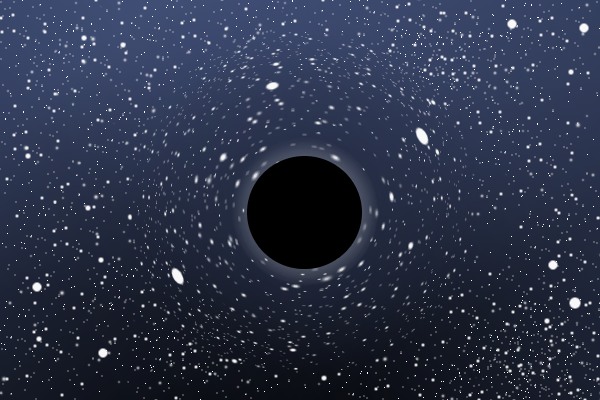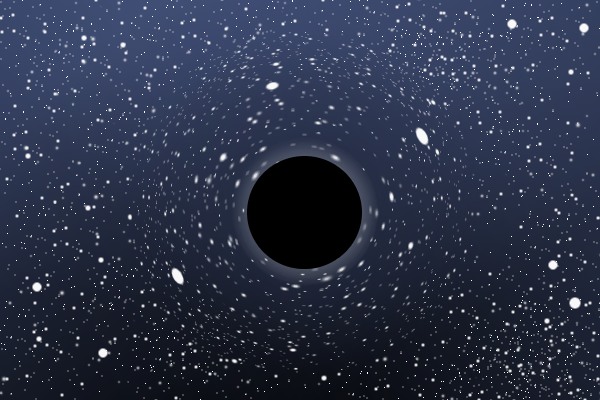One correction of my previous post is the lack of evidence for the existence, but like a lot of the cutting edge of Physics, Cosmology, and Quantum Mechanics is beyond the scope of evidence we can see by any contemporary means of what we call evidence.
The conclusion based on the following remains that there is absolutely no evidence of a definable beginning of our universe or our physical existence., and it remains a possibility that our physical existence is eternal, infinite or simply in the nothingness of a Quantum existence.. We cannot conclude that our universe 'began as a singularity.
In the real universe, no black holes contain singularities. In general, singularities are the non-physical mathematical result of a flawed physical...

www.wtamu.edu
Does every black hole contain a singularity?
Category:
Space Published: September 13, 2013
Artistic rendering of a black hole. Public Domain Image, source: Christopher S. Baird.
In the real universe,
no black holes contain singularities. In general, singularities are the non-physical mathematical result of a flawed physical theory. When scientists talk about black hole singularities, they are talking about the errors that appear in our current theories and not about objects that actually exist. When scientists and non-scientists talk about singularities as if they really exist, they are simply displaying their ignorance.
A singularity is a point in space where there is a mass with infinite density. This would lead to a spacetime with an infinite curvature. Singularities are predicted to exist in black holes by Einstein's theory of general relativity, which is a theory that has done remarkably well at matching experimental results. The problem is that infinities never exist in the real world. Whenever an infinity pops out of a theory, it is simply a sign that your theory is too simple to handle extreme cases.
For example, consider the simplest physical model that accurately describes how waves travel on a guitar string. If you drive such a string at its resonant frequency, the simplest model predicts that the vibration of the string will increase exponentially with time, even if you are driving it gently. The string actually does this... up to a point. The problem is that the exponential function quickly approaches infinity. The model therefore predicts that a guitar string driven at its resonant frequency will, in time, vibrate passed the moon, passed the stars, out to infinity, and then back. Does the string actually vibrate infinitely just because the model says so? Of course not. The string snaps long before vibrating out to the moon. The appearance of the infinity in the model therefore indicates that the model has reached its limitations. The simple model of waves on a string is correct as long as the vibrations are small. To avoid the infinity in the equations, you need to build a better theory. For vibrating guitar strings, all you have to do is add to the model a description of when guitar strings snap.
As another example, consider a thin glass drinking goblet. If a singer sings a note at the right pitch, the goblet begins to shake more and more. The simplest model would predict that, in time, the goblet will be shaking infinitely. In real life, this does not happen. Instead, the singing causes the goblet to
shatter to pieces when the shaking becomes too violent.
Every scientific theory has its limitations. Within its realm of validity, a good theory matches experimental results very well. But go beyond the limitations of a theory, and it starts giving predictions that are inaccurate or even just nonsense. Physicists hope to one day develop a theory of everything that has no limitations and is accurate in all situations. But we do not have that yet. Currently, the best physics theories are quantum field theory and Einstein's general relativity. Quantum field theory very accurately describes the physics from the size of humans down to the smallest particle. At the same time, quantum field theory fails on the planetary and astronomical scales, and, in fact, says nothing at all about gravity. In contrast, general relativity accurately predicts gravitational effects and other effects on the astronomical scale, but says nothing about atoms, electromagnetism, or anything on the small scale. Using general relativity to predict an electron's orbit around an atomic nucleus will give you embarrassingly bad results, and using quantum field theory to predict earth's orbit around the sun will likewise give you bad results. But as long as scientists and engineers use the right theory in the right setting, they mostly get the right answers in their research, calculations, and predictions.
The good thing is that general relativity does not overlap much with quantum field theory. For most astronomical-scale and gravitational calculations, you can get away with using just general relativity and ignoring quantum field theory. Similarly, for small-scale and electromagnetic calculations you can get away with using quantum field theory and ignoring general relativity. For example, you use just quantum field theory to describe what the atoms in the sun are doing, but use just general relativity to describe what the sun is doing as a whole. Many efforts are underway to consistently unite quantum field theory and general relativity into one complete theory, but none of these efforts have been fully solidified or confirmed by experiments. Until a successful theory of everything comes along, physicists can mostly get by with using both general relativity and relativistic quantum theory in a patchwork manner. This approach mostly works because the realms of validity of both theories do not overlap much. But this approach breaks down when you have an astronomical object collapsed down to quantum sizes, which is exactly what a black hole is.
A black hole forms when a massive star runs out of the fuel needed to balance out gravity, and collapses under its own gravity to a very small size. General relativity predicts that the star collapses to an infinitely small point with infinite density. But, as should now be clear, such a beast does not really exist in the real world. The appearance of a black hole singularity in general relativity simply indicates that general relativity is inaccurate at very small sizes, which we already knew. You need quantum field theory to describe objects of small sizes. But, quantum field theory does not include gravitational effects, which is the main feature of a black hole. This fact means that we will not known exactly what is going on in a black hole until scientists can successfully create a new theory that accurately describes small sizes and strong gravitational effects at the same time. Whatever the new theory ends up telling us, it will most certainly not say that there are singularities in black holes. If it did, that outcome would simply indicate that the new theory is just as bad as the old theory. In fact, one of the requirements for the future theory of everything is that it not predict singularities in black holes. In this sense, the interiors of black holes are the final frontier for theoretical physics. Just about everything else in the universe can be accurately described (at least in principle) using our current theories.


